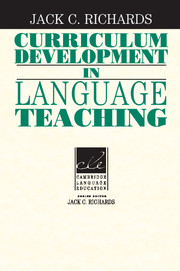Book contents
- Frontmatter
- Contents
- Series editor's preface
- Preface
- Credits
- 1 The origins of language curriculum development
- 2 From syllabus design to curriculum development
- 3 Needs analysis
- 4 Situation analysis
- 5 Planning goals and learning outcomes
- 6 Course planning and syllabus design
- 7 Providing for effective teaching
- 8 The role and design of instructional materials
- 9 Approaches to evaluation
- Author index
- Subject index
5 - Planning goals and learning outcomes
Published online by Cambridge University Press: 03 May 2010
- Frontmatter
- Contents
- Series editor's preface
- Preface
- Credits
- 1 The origins of language curriculum development
- 2 From syllabus design to curriculum development
- 3 Needs analysis
- 4 Situation analysis
- 5 Planning goals and learning outcomes
- 6 Course planning and syllabus design
- 7 Providing for effective teaching
- 8 The role and design of instructional materials
- 9 Approaches to evaluation
- Author index
- Subject index
Summary
It was suggested in Chapter 1 that early planners of English-language courses saw the purpose of language teaching as self-evident. It was sufficient to state that the goal of a course was to teach English. The ESP movement argued that this approach was inadequate and that in order to teach English it was necessary to find answers to much more specific questions: What kind of English? At what level of proficiency? And for what purposes? Needs analysis seeks to provide answers to these questions and situation analysis seeks to identify the role of contextual factors in implementing curriculum change. In this chapter we will consider another crucial dimension of decision making in curriculum planning: determining the goals and outcomes of a program.
Several key assumptions about goals characterize the curriculum approach to educational planning. These can be summarized as follows:
• People are generally motivated to pursue specific goals.
• The use of goals in teaching improves the effectiveness of teaching and learning.
• A program will be effective to the extent that its goals are sound and clearly described.
These principles appear to be self-evident and uncontroversial, and most language programs describe their goals in terms of aims and objectives. The nature of aims and objectives, however, is not necessarily straightforward because they refer to knowledge, skills, and values that educational planners believe learners need to develop. In deciding on goals, planners choose from among alternatives based on assumptions about the role of teaching and of a curriculum.
Information
- Type
- Chapter
- Information
- Curriculum Development in Language Teaching , pp. 112 - 144Publisher: Cambridge University PressPrint publication year: 2001
